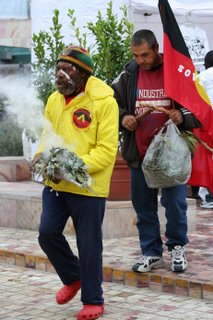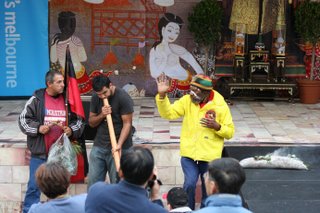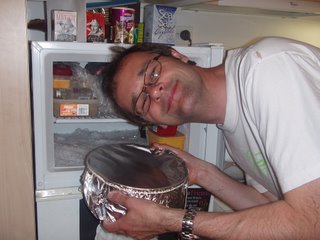This weekend's elections in the Solomon Islands has eroded the powerbase of Prime Minister Sir Allan Kemakeza. With
counting continuing, it's unclear whether his People's Alliance Party will cling to power - but our correspondent, Lukim Iu, reports from Honiara that a change of government is just the first step to stopping the rot that's eroding the islands.
Check out his entertaining, and ominous, report on corruption in paradise:
Several times, in the early days of the civil strife, Solomon Islands police raided Charles Dausabea's property near Henderson airfield, outside Honiara, looking for stolen weapons.
Dausabea, who was opposition whip then, was to become a prominent member of the Malaitan Eagle Force, one of the main militias in the five year civil war, which ended in 2003.
That war is now commonly called the ethnic tensions.
At its height, in 2000, the year of the coup, which displaced the government of Prime Minister Bartholomew Ulufa'alu, there was a gun battle outside Dausabea's property, between the MEF and the Guadalcanal Revolutionary Army.
That battle, like the police raids before it, was inspired by reports of large caches of stolen weapons, Dausabea was said to keep there.
Six years later, in the first elections since the Australian led intervention, which restored peace in the Solomons, Dausabea won back the seat in parliament, that he lost in 2001.
Another MEF dignitary, for want of a better word, the prominent Honiara lawyer, scoundrel and thug, Andrew Nori, also stood for parliament in the April 2006 elections.
At the time of writing, the result in the seat he contested, had not been declared.
But the Prime Minister, Sir Allan Kemakeza, was re-elected, even though police admitted, on the eve of the elections, that they are investigating reports that aid money, worth $US5 million, has not been seen since it entered Sir Allan's office.
Voters in Sir Allan's well-watered electorate, which takes in the Savo and Russell Islands, also disregarded another disturbing report.
That said Sir Allan still runs a secret political slush fund, bankrolled by Taiwan, which, is more commonly known as the Republic of China in Solomon Islands.
What's in a name, after all - if accepting it gets you a hospital, two fire trucks, police motorcycles and all the know-how your country will ever need, to grow its own rice.
A new report, published by the Centre for Independent Studies in Australia, found that the millions of dollars neighbouring Vanuatu has received in aid, over the past two decades, hasn't raised the living standards of that island nation's poor, at all.
Instead, it says, the money has largely been appropriated by Vanuatu's ruling elite, including that island nation's bloated, and sadly misnamed, public service.
By now, I guess, you are starting to see how these things can happen.
Vanuatu's elite is certainly not alone.
One Solomon Islands politician, though, has been vigorously fighting the political corruption he says comes with Taiwan's aid.
This, of course, is Joses Tuhanuku, the sole Labor party MP in the 50 member SI parliament.
Until, that is, the April 2006 election.
Joses campaigned hard against the secret slush fund he says Kemakeza administers, with Taiwan standing in the background, writing cheques.
He was beaten by a man named Seth Gukuna, a former Solomon Islands ambassador to, guess where?
That's right.
Taiwan.
Your knowledge of Pacific Island politics is truly remarkable.
Tuhanuku, incidentally, is the husband of two time Walkley Award winning journalist, Mary-Louise O'Callaghan.
As you know, the party system in Solomon Islands is very weak.
Although the counting is still far from complete, the balance of power in the new parliament, will almost certainly be held by independents.
Before the end of the month, a special sitting of the new parliament will be held, to choose a new Prime Minister for the next four years.
Over the past few months, an enthusiastic band of idealistic young Solomon Islanders has been campaigning hard for a clean election, under the banner of the The Winds of Change organisation.
They took out advertisements in the Solomon Star, inviting their fellow citizens to sign pledges, declaring, effectively, that they would not sell their votes to the highest bidder. Thousands did.
But new plastic water tanks started mysteriously appearing throughout the electorate of one senior minister, who is notorious for marrying a series of his house-girls.
Most analysts are cautious about predicting who will be Solomon Islands Prime Minister, at the end of this month.
I'm not.
I'd be prepared to bet, even at this stage, that it will be the incumbent, Sir Allan Kemakeza.
You will, by now, have guessed why.
He has the biggest slush fund at his command.
No-one else comes close.
He also has a very good reason to fight hard for his job.
As Prime Minister, he may well be untouchable.
Effectively, above the law.
Even if he stole millions, effectively depriving thousands of Solomon Islands children of both decent educations and effective health care.
If Kemakeza loses the top job, though, he might well find himself in Rove prison, with Harold Keke, Ronnie Cawa and Francis Lela for neighbours.
And those old Weathercoast warlords still have a few scores to settle with Sir Allan.






